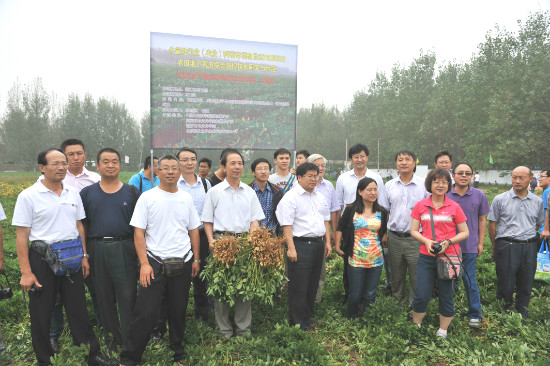分享到
A novel microcapsule insecticide formulation against soil grub developed
A novel formulation 18% fipronil•chlorpyrifos microcapsule suspension for seed treatment (18% fipronil•chlorpyrifos CF) is developed by Institute of Plant Protection (IPP), Chinese Academy of Agricultural Sciences (CAAS). According to the information, it showed an excellent efficacy against soil grubs on the on-site demonstration held recently in Linyi City, Shandong Province.


Cao Yazhong, Chief Expert of this research team from the IPP says, grubs are the principal culprit for peanut planting in China. They can cause sprout deficiency at the seedling stage and eat fruits exclusively at the fruiting phase, generally decreasing the yield by 20~30%, and even by 60~70% when outbreak happens, just as farmers often say "the number of grubs is equal to peanuts or even more". And in order to control against grubs in some particular areas, farmers usually use highly toxic pesticides like carbofuran and phorate, which subsequently cause food security problems.
Yang Daibin, inventor of the 18% fipronil•chlorpyrifos CF from IPP introduced, it consists of two active ingredients with different mode of action. It is produced with sophisticated technique, and the microcapsules in this formulation are just several microns with above 95% of active ingredients encapsulated, thus makes this microcapsule formulation of high safety, high efficiency and longer duration.
In 2013, it has been applied in more than 200,000 mu (13,333 hectares) in the Provinces of Shandong, Henan, Hebei and Liaoning. And in 2014, as estimated by experts, its application area is about 1,000,000 mu (66,667 hectares).
Yang Daibin, inventor of the 18% fipronil•chlorpyrifos CF from IPP introduced, it consists of two active ingredients with different mode of action. It is produced with sophisticated technique, and the microcapsules in this formulation are just several microns with above 95% of active ingredients encapsulated, thus makes this microcapsule formulation of high safety, high efficiency and longer duration.
In 2013, it has been applied in more than 200,000 mu (13,333 hectares) in the Provinces of Shandong, Henan, Hebei and Liaoning. And in 2014, as estimated by experts, its application area is about 1,000,000 mu (66,667 hectares).
Latest News
-
 Apr 18, 2024Opening Ceremony of the Training Workshop on Wheat Head Scab Resistance Breeding and Pest Control in Africa Held in CAAS
Apr 18, 2024Opening Ceremony of the Training Workshop on Wheat Head Scab Resistance Breeding and Pest Control in Africa Held in CAAS -
 Apr 03, 2024IPPCAAS Co-organized the Training Workshop on Management and Application of Biopesticides in Nepal
Apr 03, 2024IPPCAAS Co-organized the Training Workshop on Management and Application of Biopesticides in Nepal -
 Mar 28, 2024Delegation from the School of Agriculture and Food Science of University College Dublin, Ireland Visit to IAS, CAAS
Mar 28, 2024Delegation from the School of Agriculture and Food Science of University College Dublin, Ireland Visit to IAS, CAAS -
 Mar 25, 2024Director of World Food Prize Foundation visited GSCAAS
Mar 25, 2024Director of World Food Prize Foundation visited GSCAAS -
 Mar 20, 2024Institute of Crop Sciences (ICS) and Syngenta Group Global Seeds Advance Collaborative Research in the Seed Industry
Mar 20, 2024Institute of Crop Sciences (ICS) and Syngenta Group Global Seeds Advance Collaborative Research in the Seed Industry
